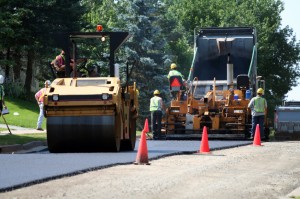Did you know that there are several different types of pavement? If not, then you have come to the right place. This week PTG Enterprises, an asphalt and concrete paving company serving Maryland, DC, and Virginia, has outlined one of these pavements below.
Hot Mix Asphalt (HMA): Hot Mix Asphalt is used in everything from runways at busy commercial airports – like Baltimore-Washington International (BWI), Oakland International, or McCarren – to racetracks and more! In fact, of the 88 tracks used in the NASCAR Short Track series, 66 are asphalt.

Benefits of Hot Mix Asphalt
- Quick Construction: HMA’s speed of construction makes it an ideal choice for high traffic areas like airports, highways, and racetracks. It is also easily rehabbed.
- Durability: Asphalt is designed to stand up to any load, from passenger cars to heavy trucks to airplanes.
- Noise Pollution: HMA produces a pavement with less noise pollution than the competition.
- Smooth Ride: HMA is known for its smooth ride.
- Cost effective: Asphalt has the lowest life cycle cost and the highest residual value of any pavement around.
No matter the application, asphalt pavements are the easy choice.
Have a Pavement Project you need completed? Call PTG Today!
When you hire PTG, you will receive the best customer service in the industry. We provide prompt proposals, competitive bids, and top notch management to every aspect pavement projects, from beginning to end.
We will show up as scheduled, perform the project as contracted, and leave you with a smile on your face!
If you have any further questions, please contact PTG Enterprises aka My Pavement Guy today by calling 410-636-8777, or click here today!

















